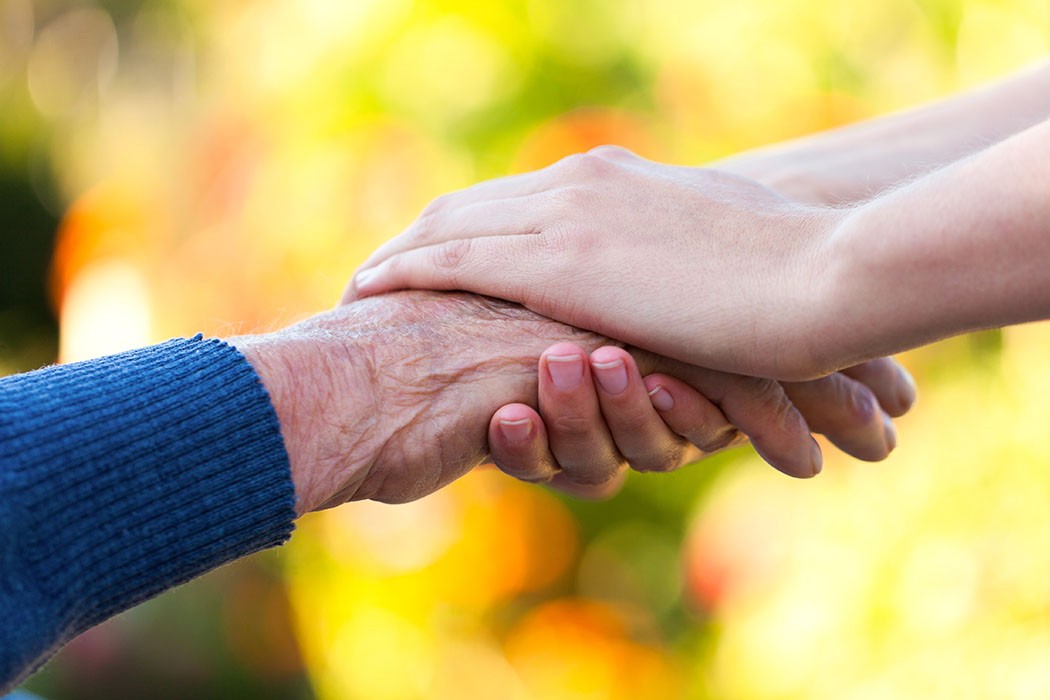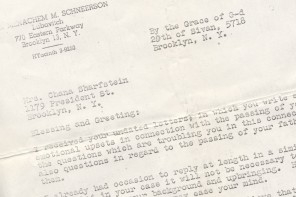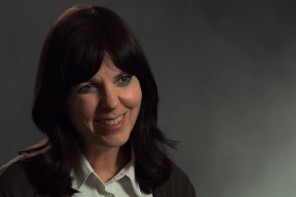Gittel Rivka—Mom’s Hebrew name. During Mom’s last months, last days and hours, it was Gittel Rivka whose hand I held, and who I sat with. Trudy Driker, the articulate, competent persona, was all but gone. Her physical life was pretty much a shell. She was emaciated, hadn’t stood or walked in months, and had labored breathing and could barely speak. But she was there. Her neshama, her soul, was there. That’s what I focused on.
Mom’s death was not unexpected. First there was a sudden onslaught of dementia, her confusion apparent as soon as she came out of anesthesia after surgery for a heart valve replacement. That had been about six years before these final days.
She’d been home, cared for by our stoic and stalwart dad, during the ensuing years of her gradual decline. Vivian and I tried to offer suggestions and interventions from our homes in Phoenix and Cincinnati, but our sporadic, well-meaning attempts didn’t make much difference.
We three kids visited more, talked on the phone more, wrung our hands, and mourned our slow loss of her. This bad time had drawn us into more frequent contact and a web of connection. We were in and out of Detroit as the bitter Michigan winter slowly turned to spring, hovering and helping a bit with her two hospitalizations, her downward journey in a rehab center, and finally to hospice care in a nursing home.
It seemed like yesterday that we were kids at the zoo, munching on cotton candy or an oversized, rainbow-streaked lollipop, running after Dad as he marched with confidence to the next exhibit. The table was turning at too fast a speed. We were tiptoeing with unsure steps into guiding our parents and taking up a bit of the slack. Dad was still in charge, but with increasing exhaustion and his own grief, he seemed to welcome leaning on our shoulders a bit. I sat on the couch in Mom’s room in Henry Ford Hospital, expecting to quietly listen and support Dad with my presence. I was surprised when he introduced me to Mom’s doctors and sat back. He seemed relieved to let us kids query them.
We tried to get them to tweak this or that, but her health continued to decline. Even though she seemed barely there, I wanted to sit and just be with her. In a way, I shared more of my real self with Mom during those winter and spring months than I ever had been able to before. I shared my real world, which her persona and more conscious self would have dismissed as gibberish.
It was so hard to walk into the hospital room and see her. Increasingly thin, agitated, unsure of her surroundings, withdrawn. But a core was there.
She was childlike. She was Dolly—her mother’s pet name for her—a sweet little girl you could tease and joke with as you got her to take one more bite, with a combination of coaxing and gentle sarcasm.
“C’mon, Mom. C’mon, Dolly. Take another bite. Mmm, this soup looks good. The milkshake is a little thick. What kind of a joint is this? How can they give my mommy service like this?”
Or:
“You’ve got a real scam going here, Trudy. Vanilla ice cream for lunch? Man, oh man, how’d you pull that one off?” She’d giggle and open her mouth conspiratorially, forgetting she had bitten the spoon in resistance one minute earlier.
As she faded more and more, I often couldn’t make contact with Dolly, the wide-eyed girl with bouncy black bottle-curls who rode the Oakland streetcar downtown to Hudson’s, her small, white- gloved hands clasped in her mommy’s.
Now I could talk to Gittel Rivka, the Yiddishe neshama, the sweet Jewish soul I had included in my prayers for years, but had never been able to directly address—because Trudy didn’t believe in souls or any other non-rational, non-quantifiable beings.
We switched roles. It was my turn to tuck her in, with sweet whispers on the evening breeze. As she drifted to sleep, I sat by the hospital bed (and later the nursing home bed) and sang. Yiddishe lullabies—Jewish words and melodies. I sang Shema, the basic prayer we say at the end of each day—and at the end of life—affirming our connection to and belief in one God. I guess I was trying to arouse her soul; to feed it, water it, give it vitamins and nourishment, much as we kept trying to get another sip of Ensure or another spoonful of yogurt into her body.
“Just trying to get some nourishment into her,” Dad would wearily report each day when I’d call. He went to the nursing home three times daily, to sit and coax another spoon or two of pudding or applesauce, a sip of water.
Ess, mein kind—eat, my child—the timeless urging of the Jewish mother. As her body was clearly diminishing, coming round the curve to the finish line, I wanted to give nourishment to her soul. It would be there anyway, when she got to the next stage, but I wanted to make it feel safe, acknowledged. It was like teaching someone a bit of the language before they take a trip abroad. Her soul knew the language, of course—it’s inherently there—but it had lain dormant for so long that I wanted to befriend it and guide it along. I hoped to help Mom feel a little less scared, to be the doula—coaching and encouraging her as she transitioned to a different realm.
Besides being with Mom as any child would, and in addition to giving Dad a break, I felt I had a mission. True, I had never died, thank God. But I knew what Jewish tradition offered up about it, and was now well-versed in neshama language. I was determined to at least try to ease the transition—to be there. To talk to her soul, as I never could before, when we could only discuss the kids, the weather, books, politics, and other common ground. But now, I could let that superficial veneer go. We could meet on a soul level; this would be our common ground.
Who was running for president or which book was a New York Times best seller was irrelevant here, in this bed in this modest room under the alcove, with this wizened woman laboring for another breath.
Her blue-and-gold-striped quilt, a touch of home, had been crocheted by Bubby Faygie. A few other personal belongings were scattered here and there. But the little corner room had few amenities: a bed, an armchair, the oxygen tank, and a dresser. More or fewer things didn’t matter at this point. The plant her friends had brought sat forlornly on the windowsill, ignored, unable to give her the desired perk at this late point.
This once-sophisticated woman was now just her bare essence, soon to leave this world from the sparse nursing-home bed. Her carefully chosen art, her lovely furniture back home, were of little use or comfort now. I tried to shower her with the kind of love I could offer: praying, ushering, escorting this rational non-believer over the threshold to join her momma and daddy, to let her neshama free.
I held her hand and talked to her as she dozed. I forgave her for whatever hurts I’d held on to, and asked her to forgive me. My eyes welled up as the words stumbled out.
“Mom, I probably hurt and disappointed you with my different choices. I chose a life that’s hard for you to understand. I’m not the daughter you thought I’d be. And I know I was too busy with the kids and my world, and I didn’t visit or connect with you enough. But I did it out of love for you, wanting to honor you the best way I know how, and I hope you will have real nachas, real satisfaction and gladness from it.”
My confession tumbled out and surprised me. Someone had advised me to ask her forgiveness, so I started it somewhat routinely, because it was a good thing to do at this juncture—and stumbled into a well of feeling.
I didn’t usually think about her perspective that much, but there must have been a hurt, an empty hole, for many years. I lived far away. My promise as a future professor or therapist was never fulfilled; I spent my days mumbling old-fashioned blessings and having one baby after another. I wasn’t able to compare notes on travel and shopping. We both shopped, of course, but Mom frequented Saks, so I didn’t think she’d want to hear about my finds at Walmart. My shopping was pretty much utilitarian—due to my tighter budget, higher volume, and less-materialistic focus.
I couldn’t even go out to eat anywhere but at the greasy kosher pizza store, and share Mom’s simple pleasure in enjoying a gourmet meal and fine wine at a great new place, for goodness’ sake.
As my older kids started leaving the nest, I came to know the emptiness that lingered in their space—and that was with my kids and I on pretty much the same page. How much emptier it must have been for her.
It seemed like Mom squeezed my hand a drop. Perhaps on some level she was acknowledging and accepting my words. I sang Jewish songs, prayers, and psalms, mumbling and chanting, hoping that the Hebrew syllables were a balm, a gentle massage to her being. In my extreme mindset, as I sat by her side, every psalm seemed to be full of heightened meaning, alluding to souls coming and going.
“Even if I walk in the valley of the shadow of death, I will fear no evil, for You are with me… Only goodness and kindness shall follow me…”
If this wasn’t the valley of the shadow of death, I didn’t know what was. Fear no evil, I emphasized, saying it a bit louder, a bit slower, as though my words were a command to her. Dear Gittel Rivka, sit up and take notice! God is with you, my dear Mommy. Only goodness and kindness, only sweetness, for you—an end to the darkness and confusion of this perplexing world—as though my words were a command to God. Please, I begged, shower and comfort and protect this sweet soul in golden, soft goodness.
“The Lord bless you and guard you. The Lord make His countenance shine upon you and be gracious to you. The Lord turn His countenance toward you and grant you peace.”
Please. Pour Your blessings on Mommy, and let her feel Your closeness, Your shining countenance, Your innerness. For some reason, You’ve let me taste a bit of Your presence, of Your grace—oh, I wish there were a better English word. It’s time to let her taste and know and get strength and comfort, too.
“Our Father, let us lie down in peace. Spread over us the shelter of Your peace. Shelter us in the shadow of Your wings; and guard our going out and our coming in for a good life and peace from now and for all time.”
The image of men quietly praying under a tallis has captured me since I first saw it. I’ve painted the soft folds and mysterious shadows, the shechina (divine presence) that seems to be hovering under there. That’s something like what I imagine the shelter of Your wings might be like. Just protect and love this innocent, little-girl soul, let her sit close to You, like a child in the shadow of her mother’s skirt.
I wanted to be awake and with her when Mom would pass on. She was agitated and clearly approaching that moment, her breath rattling and irregular. I reached through the bed railing and held her hand—not too tight, but there. Kept dozing off and pulling my eyes back open. But around 11:00 P.M. I collapsed into an exhausted sleep in the recliner that I had pulled close to her side.
With a sudden jolt, I sensed the nurse coming to check her at 1:00 A.M. One glance and I knew, before the nurse could utter the words.
“She’s passed.”
Mom was gone. That tiny remaining bit of enlivening life force had left.
I was shocked and frozen. She looked like an empty shell, like the newly deceased women I had helped prepare for a traditional burial. I sat there for a moment, then picked up the phone to call Yankel and Dad, hands trembling.





